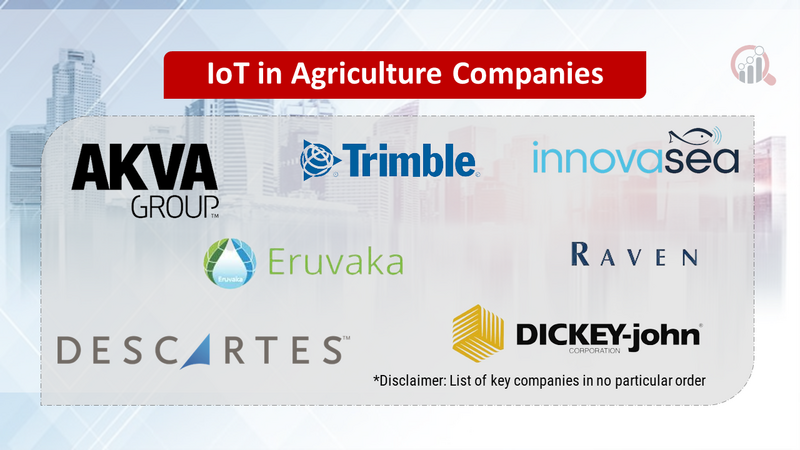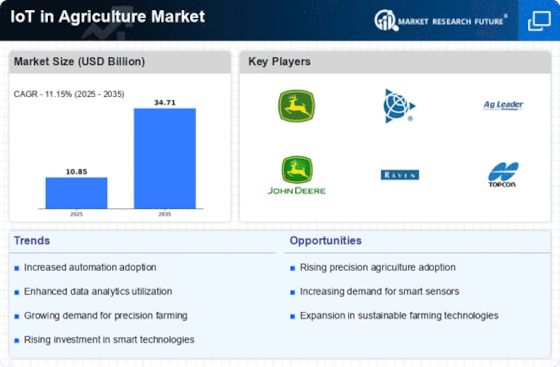Top Industry Leaders in the IoT Agriculture Market

Competitive Landscape of the IoT in Agriculture Market:
The Internet of Things (IoT) is revolutionizing agriculture, transforming traditional practices into data-driven, precise operations. This burgeoning market, estimated to reach high growth by 2030, is attracting an array of established players and nimble startups, jostling for dominance in various segments.
Key Players:
- Trimble Inc.
- Eruvaka Technologies
- Raven Industries
- Dickey John
- Descartes Labs
- AKVA group
- InnovaSea Systems
Factors for Market Share Analysis:
-
Product Portfolio: Breadth and depth of offerings across hardware, software, and data analytics capabilities hold significant weight. Players with comprehensive solutions cater to diverse farm sizes and needs, gaining an edge.
-
Geographical Reach: Global presence and efficient distribution networks are crucial, especially in fast-growing regions like Asia and Latin America. Strong partnerships with local players can bridge cultural and infrastructural gaps.
-
Technical Expertise: Superior sensor technology, robust data security protocols, and advanced analytics platforms differentiate leaders. Integration with AI and machine learning further unlocks the potential of real-time data insights.
-
User Experience: Ease of installation, intuitiveness of interfaces, and seamless data accessibility are critical for farmer adoption. Mobile-friendly applications and cloud-based dashboards simplify data management.
-
Sustainability Focus: Solutions that optimize resource utilization, reduce waste, and promote environmental health resonate with conscious farmers and consumers. Carbon footprint reduction and climate-resilient practices are becoming key differentiators.
Emerging Companies and Trends:
-
Vertical Farming Startups: Companies like Plenty and AeroFarms utilize controlled environments and IoT to optimize indoor crop production, catering to urban populations and reducing reliance on traditional agriculture.
-
Precision Livestock Farming: Companies like Afimilk and BouMatic leverage wearable sensors and real-time data analysis to improve animal health, optimize feed and energy consumption, and increase milk production.
-
Blockchain Integration: Startups like Agriledger and FoodTrust explore blockchain technology to enhance traceability, transparency, and trust in food supply chains, benefiting farmers and consumers alike.
Current Investment Trends:
-
Venture Capital: VC firms are pouring billions into agtech startups, recognizing the immense potential of IoT to transform the agricultural landscape. Investments focus on innovative solutions addressing specific pain points and disrupting established practices.
-
Corporate Ventures: Leading agriculture companies are investing in promising startups to acquire new technologies and talent, bolstering their own offerings and staying ahead of the curve.
-
Government Initiatives: Numerous governments are promoting adoption of IoT in agriculture through subsidies, grants, and infrastructure development projects, spurring market growth and attracting further investment.
The Road Ahead:
The competitive landscape of the IoT in agriculture market is fluid and dynamic. Players will need to adapt to evolving farmer needs, embrace technological advancements, and prioritize collaboration. Continued innovation, integration with AI and blockchain, and a focus on user-centric solutions will be key drivers of success in this burgeoning market. As the world grapples with food security challenges and climate change, the intelligent application of IoT holds immense promise for a more sustainable and productive future of agriculture.
Latest Company Updates:
-
January 2024: Researchers develop new low-power IoT sensors for monitoring soil moisture and nutrient levels. -
December 2023: AI-powered drones gain traction for crop health monitoring and pest control. -
December 2023: John Deere partners with Microsoft to develop edge computing solutions for precision agriculture. -
November 2023: Cropital raises USD 20 million to expand its AI-powered agricultural data platform.










